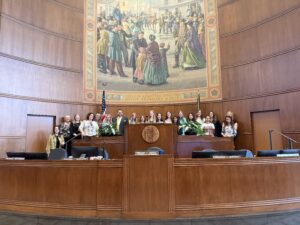As part of promoting a pro-life culture in Oregon, ORTL Education Foundation (ORTLEF) launched an ambitious project: publishing community resource guides as a “one-stop shop” for anyone looking for local means of support when faced with unsupported pregnancies, end-of-life issues, disabilities, addiction, childcare obstacles and more.
So far, three guides — Lane County, Deschutes County and Northeast Oregon — have been printed and distributed, and ORTL community outreach director Makyra Williamson calls the response “incredible.”
“It has opened doors for us to reach new organizations and people with the pro-life message. It’s a way to partner with people who aren’t necessarily pro-life but want to support people in their community,” says Williamson, who was responsible for the guides’ final proofing, editing and resource-vetting. “We even received an email this week from someone who said she accidentally ran across one of our Lane guides — and she requested several more!”
Lois Anderson, ORTL’s executive director, has long envisioned the guides as part of the goal for the organization’s pro-life communities initiative, which strives to ensure that every abortion-vulnerable woman has at least one compassionate, informed pro-life advocate in her circle who can empower her to choose life. The resource guides are a key part of making that vision possible as the ORTLEF team puts its vetted list of life-affirming resources into local communities.
“Our guides are unique in that we specifically create them to include only life-affirming resources where we can safely send abortion-vulnerable women for assistance,” Williamson says. “That means that we have to meticulously screen organizations’ mission statements, partner organizations, etc. In several cases, we only fully vet the organization by calling or meeting with them to learn what types of resources they refer to and what their stance on abortion is.”
“we specifically create the guides to include only life-affirming resources where we can safely send abortion-vulnerable women for assistance”
Curated and designed by current ORTLEF team members and former interns Katana Liebelt and Ellaynah Brown, the guides are like a telephone book for anyone in need, listing resources from food banks to maternity homes.
“Many people associate Oregon Right to Life with its Political Action Committee and tend to shy away from discussing politics,” says Shannon Garlitz, ORTL’s community outreach coordinator for Eastern Oregon. “However, the resource guides provide a way to shift the focus toward the work of the Oregon Right to Life Education Foundation. They allow me to explain the positive, non-political impact of the organization.”
Up next is the shared guide for Marion and Polk Counties, coming out this fall. Eventually, every area in Oregon will have its own.
“There’s something special about a print resource guide that fully helps people understand local resources,” Williamson says. “I really believe this project is serving women and families, and it’s something that is brand-new to Oregon.”
“We’ve never seen a network and database of resources that are life-affirming and this expansive in Oregon.”
To view digital versions of the community resource guides, see ortl.org/community-resources. To submit a resource recommendation, including church ministries, food banks, support groups, Grief Share, daycare, etc., fill out the form at ortl.org/community-resources.
To order copies of our local resource guides, call (503) 463-8563 or email makyra@ortl.org.




